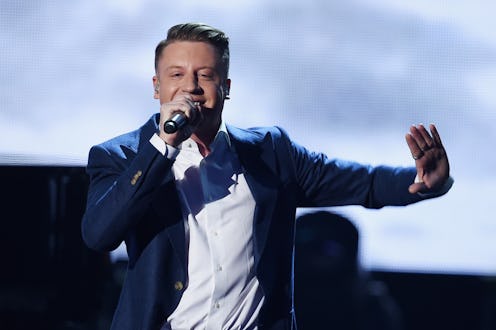Entertainment
Macklemore Stirs Up Controversy Again
Ryan Lewis and Macklemore have just released a track that's making me wish they would go back to the days of rapping about thrift shops in a catchy way. On Friday, Macklemore & Lewis released "White Privilege II" from their upcoming album The Unruly Mess I Made. Who would have known that album title would provide so much foreshadowing to the heat they are getting because of their latest single? The song, which is a follow up to their track "White Privilege" off their 2005 album The Language of My World, has thrown the internet into a frenzy.
The issues Macklemore addresses mostly revolve around the idea that there are "good" pieces of black culture that people like Miley Cyrus and Iggy Azalea — yes, he threw them under the bus — have chosen to adopt, without in turn speaking out for the truly important issues like the Black Lives Matter movement. In the song he raps,
You’ve exploited and stolen the music, the moment
The magic, the passion, the fashion, you toy with
The culture was never yours to make better
You’re Miley, you’re Elvis, you’re Iggy Azalea
It's pretty clear he's taking no prisoners in this battle.
Not only does Macklemore rap about his white privilege and the Black Lives Matter movement, but even Elvis gets thrown in as well. Although, the impending celebrity backlash is the least of Macklemore and Lewis' worries, considering the fan response has been swift and unforgiving.
Personally, I think no matter your opinion, art is supposed to make you uncomfortable. While I enjoy listening to the fun songs about poppin' tags and going downtown as much as the next person, it's songs that bring up uncomfortable truths that need to be heard. More importantly, that need to be felt. We should let the discomfort of this song move us to change, but should that message have come from Macklemore? Feelings on that matter are all over the board, especially on Twitter.
While many people can't decide whether his song was for vanity or for real change, Macklemore is standing by his words: "This song is the outcome of an ongoing dialogue with musicians, activists, and teachers within our community in Seattle and beyond.Their work and engagement was essential to the creative process," he told Billboard.
Whether you love it or hate it, at least we're now talking about the issues of privilege that the song addresses. All I can ask is that this song inspires more music that can continue to bring issues like racism to the forefront of American thought and engagement.
